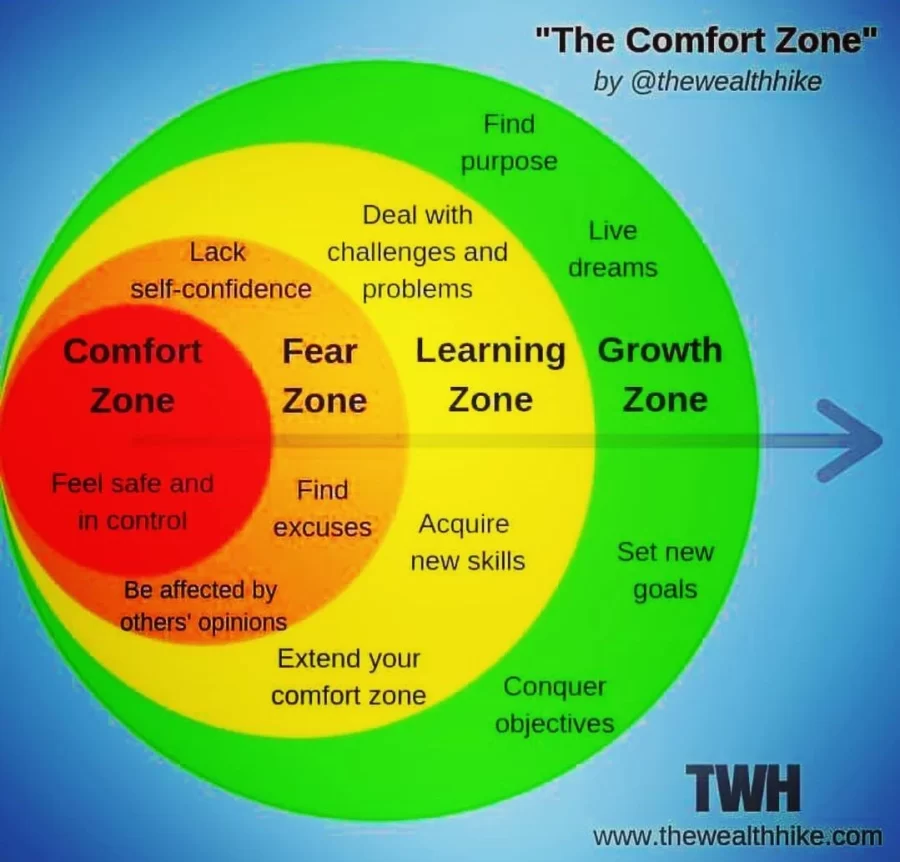Maintaining a comfort zone is vital
In the midst of a high-achieving culture, we must take time to smell the roses
Columnist Jimena Elmfudi writes that it is important to stay in your comfort zone sometimes.
February 16, 2023
“Step out of your comfort zone” is arguably the single most overused phrase in every motivational speech. Life coaches and leadership gurus market it as the key to success. I cannot deny that it’s an effective motto that advocates for constant growth and prevents you from feeling stagnant. But what does being outside of your comfort zone 24/7 do to your mental and physical health?
Like many ideas in our overly stimulated lives, the concept of working until you drop can be blown exaggeratedly out of proportion. Yes, challenging yourself is crucial to personal development. However, as a society, we have slowly created the notion that being in a zone of comfort is an absolute sin.
The “hustle” is now a glamorized mandate — an unforgiving obsession. Modern society has negatively labeled the comfort zone as an unproductive state drilling in us a constant need for disturbance in order to feel like we’re progressing toward something. We have satanized the healthy state of being at ease as if being at peace invariably means we are slacking or engulfed in mediocrity. Our discomfort zone becomes our comfort zone, and this can quickly turn into a falsely balanced life.
We have made it seem as if we must swiftly move on to the next big thing after pushing ourselves out of our comfort zones and reaching a set goal. This mindset encourages us to make choices that are challenging without considering their benefits. We choose to do things that don’t necessarily push us forward and are based solely on the need for external validation. Many of us have become so used to tolerating the state of burnout for the sake of victory that we have intuitively welcomed extreme discomfort in our day-to-day lives and blindly accepted it as part of the “no pain, no gain” mentality.
Being surrounded by an environment that lives off of academic validation can be quite intimidating at times. The crown atop the Wake Forest School of Business is oftentimes more toxic than supportive. The number of internships you did or organizations you lead is flaunted around campus left and right, and this applies universal pressure to those who are already doubting their academic performance.
I argue that this makes us feel safe in our discomfort so that, when we do step into our comfort zones, it is too good to be true; therefore we guilt-trip ourselves into finding a way out of comfort once again.
Overstaying your welcome in that zone of discomfort can ultimately lead to perpetual demotivation since everything you do feels like it requires so much from you.
Proof of productivity doesn’t always have to involve extreme hardship. On some occasions, leaving your comfort zone does more harm than good. Maintaining a comfort zone allows us to seek safety when our rapidly changing lives bring us too much uncertainty.
Your comfort zone should be safe and reliable. We’re often so caught up in our journeys that we forget to take a breather and enjoy the simple pleasures, or as Lady Gaga wisely sings …“ain’t it hard keeping it so hardcore?”
Let’s remind ourselves that while working hard to achieve important life goals, we must simultaneously strive for serenity. As cheesy as it sounds, we must stop and smell the roses. Professional and personal growth shouldn’t be divorced from one another. One shouldn’t sacrifice for the other. The road on which we are racing is pierced with flashy signs advertising success as a constant climb without any pit stops. But it takes courage to stop, refuel and accept that perfection is not a feature that belongs to us.
Correction Feb. 21: An earlier version of the subhead contained a typo that has now been corrected.






















